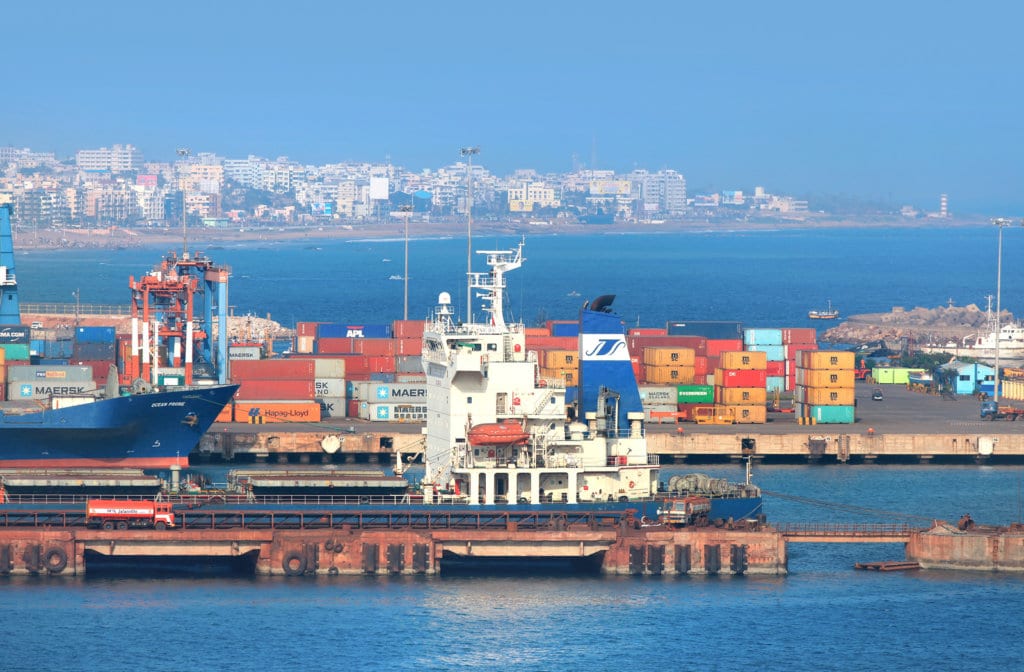India’s harbors have become clogged up with coal as imports to power an expanding economy outpace railroad capacity to transfer the fuel to consumers.
Stockpiles rose by 15 percent in seven weeks to 19.2 million metric tons, according to data from 18 ports compiled by CoalMint in a July 30 report. Inventory at Vishakhapatnam Port Trust in the eastern state of Andhra Pradesh is near the limit because a rail-car shortage is slowing distribution, Deputy Chairman P.L. Haranadh said in a phone interview.
The stockpile of 1.2 million metric tons is “pretty much all we can hold,” Haranadh said. His port gets about 10 of the wagon clusters known as rakes each day to send coal to consumers, against a requirement of 16. A rake comprises about 60 open-top wagons with total capacity of some 4,000 tons.
The port blockages reflect the inability of India’s infrastructure to cope with an expanding economy and consumption. Freight and passenger trains jostle for space on the same tracks, and goods carriers often have to make way for passenger traffic, prolonging the turnaround time for carriages to haul coal, the mainstay of power generation in the country.
Bottlenecks in coal supply are hurting utilities, aluminum smelters and steel mills. Some 8.7 gigawatts of generation capacity was shut as of the end of June due to coal shortages, according to Bloomberg calculations based on Central Electricity Authority data. India has 197 gigawatts of coal-fired capacity.
At Paradip Port Trust in Odisha state nearly 4 million tons of cargo — including 3 million tons of coal — has piled up, almost double the storage capacity, said a port official, who asked not be identified discussing a sensitive topic. The logjam has forced Paradip to divert cargoes to other ports, even though most have similar bottlenecks, the official said. The port, which needs an additional five rakes a day, is encouraging coal customers to transport coal by road. That’s more cumbersome, costly and damaging to the environment.
A blockage at Gangavaram port, close to Vishakhapatnam port, has delayed transportation of 120,000 tons of coal to electricity producer Jindal Power Ltd. Nearly half is still lying at the port three months after the cargo landed, Chief Executive Officer Bharat Rohra said.
Mundra port in Gujarat state on the west coast is also struggling with a shortage of carriages, according to two officials, who asked not to be identified because they weren’t authorized to speak to the media. The shortage of as many as six rakes a day started in May, and primarily slowed fertilizer shipments, one of the officials said.
Krishnapatnam Port in Andhra Pradesh on the east coast requires another five to six rakes a day for all commodities including coal, iron ore and fertilizer, in addition to the 14 to 15 that are being loaded currently, Chief Executive Officer Anil Yendluri said by phone.
“We are also facing a challenge in getting the number of rakes, like all others,” Yendluri said. “But we are continuously working with the railways and seeing that turnaround time improves.”
Power stations designed to burn domestic coal were forced to increase imports for blending by 15 percent during the quarter ended June 30, as local output failed to keep pace with surging demand. Monopoly miner Coal India Ltd., responsible for more than 80 percent of the nation’s coal output, has missed production and shipment targets every year since at least 2013.
Last month, India’s power minister R.K. Singh warned of continuing coal shortages because of increasing demand for electricity and advised states to import the fuel if necessary.
To address the problem, state-run Indian Railways is ordering more wagons and is building new tracks with Coal India.
“We are doing everything we can to ensure availability of rakes and we have seen a significant increase in rake supplies for coal,” said Girish Pillai, who heads traffic management at Indian Railways. “But it may so happen that sometimes we fall short of demand.”
(c) 2018, Bloomberg
